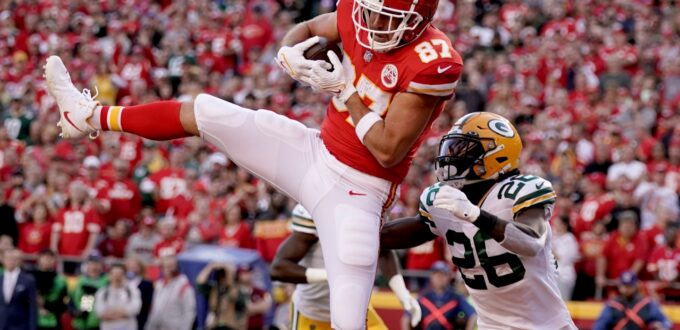KANSAS CITY, Mo. — Kansas City Chiefs tight end Travis Kelce and Grammy Award-winning singer-songwriter Billie Eilish have something in common — broadcasters butcher their names.
And virtually everyone is having trouble with “omicron.”
All three made it onto this year’s list of most mispronounced words. The list is compiled every year by the U.S. Captioning Company, which captions and subtitles real-time events on TV and in courtrooms.
The list released Tuesday identifies the words that proved most challenging for anchors, reporters and other people on television to pronounce.
The caption company said it surveyed its members to generate the list, which was commissioned by Babbel, a language-learning platform with headquarters in Berlin and New York.
“Newscasters in the U.S. have struggled with 2021′s new words and names while reporting on key sporting events, viral internet trends and emerging celebrities,” said Esteban Touma, a standup comedian and teacher for Babbel.
“As a language teacher, it’s always interesting to see that some of these terms are usually new colloquialisms, or are rooted or borrowed from another language,” he said. “As a non-native speaker, I must confess it’s fun to see English speakers stumbling a bit for a change.”
Here’s how Touma breaks down the proper pronunciations for the most commonly misspoken words:
— Kelce (KELs): Kansas City Chiefs star Travis Kelce revealed this year that his teammates and the media had been mispronouncing his name for years.
— Cheugy (CHOO-gee): A trendy term popularized by Gen Z and used to mock an outdated and unfashionable aesthetic typically associated with millennials, such as “Live, Laugh, Love” signs.
— Chipotle (chih-POHT-lay): The American fast food chain became the center of a viral trend this year challenging Baby Boomers to pronounce the name.
— Dalgona (tal-goh-NAH): A Korean treat made with melted sugar and baking soda, popularized in Netflix’s “Squid Game.” (Touma notes that some speakers seem to produce a ”K” instead of the ”G” in the middle syllable.)
— Dogecoin (DOHJ-coin): A divisive cryptocurrency that began somewhat ironically before being popularized by Elon Musk, causing its value to dramatically increase.
— Eilish (EYE-lish): The singer Billie Eilish, whose album “Happier Than Ever” was released this year to critical acclaim and nominated for the Grammy Awards’ Album of the Year.
— Ethereum (ih-THEE-ree-um): Another cryptocurrency that skyrocketed in value this year amid the decentralized currency.
— Ever Given (EV-er GIV-en): The name of the ship that blocked the Suez Canal in March, costing billions of dollars in lost trade. Many newscasters mistook the name of the ship as “Evergreen,” the name of the company that owns the vessel, which was printed on its hull.
— Glasgow (GLAHZ-go): The host city of November’s United Nations Climate Conference was mispronounced by both President Joe Biden and former president Barack Obama.
— Omicron (AH-muh-kraan / OH-mee-kraan): A new variant of COVID-19 first identified in November, named in keeping with the World Health Organization’s system of identifying variants with Greek letters. (Touma notes it’s pronounced differently in the U.S. and the U.K.)
— Shein (SHEE-in): The Chinese fast fashion company at the center of the “Shein haul” trend, in which participants record themselves trying on numerous different outfits from the company.
— Stefanos Tsitsipas (STEH-fuh-nohs TSEE-tsee-pas): Currently ranked as the world’s No. 4 tennis player, the Greek athlete rose to international prominence when he lost to Novak Djokovic in the final of the French Open in June.
— Yassify (YEAH-sih-fai): A popular trend in which multiple beauty filters are applied to well-known pictures or portraits for comic effect.

No Comments Yet